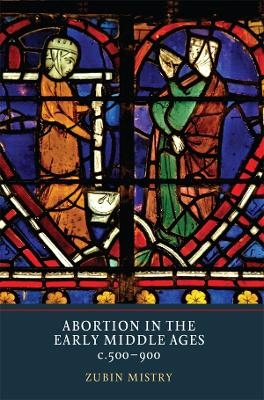
Abortion in the Early Middle Ages, c.500-900
Seiten
2017
York Medieval Press (Verlag)
978-1-903153-75-8 (ISBN)
York Medieval Press (Verlag)
978-1-903153-75-8 (ISBN)
First full-length study of attitudes to abortion in the early medieval west.
When a Spanish monk struggled to find the right words to convey his unjust expulsion from a monastery in a desperate petition to a sixth-century king, he likened himself to an aborted fetus. Centuries later, a ninth-century queenfound herself accused of abortion in an altogether more fleshly sense. Abortion haunts the written record across the early middle ages. Yet, the centuries after the fall of Rome remain very much the "dark ages" in the broader history of abortion.
This book, the first to treat the subject in this period, tells the story of how individuals and communities, ecclesiastical and secular authorities, construed abortion as a social and moral problem across anumber of post-Roman societies, including Visigothic Spain, Merovingian Gaul, early Ireland, Anglo-Saxon England and the Carolingian empire. It argues early medieval authors and readers actively deliberated on abortion and a cluster of related questions, and that church tradition on abortion was an evolving practice. It sheds light on the neglected variety of responses to abortion generated by different social and intellectual practices, including church discipline, dispute settlement and strategies of political legitimation, and brings the history of abortion into conversation with key questions about gender, sexuality, Christianization, penance and law. Ranging across abortion miracles in hagiography, polemical letters in which churchmen likened rivals to fetuses flung from the womb of the church and uncomfortable imaginings of resurrected fetuses in theological speculation, this volume also illuminates the complex cultural significance of abortion in early medieval societies.
Zubin Mistry is Lecturer in Early Medieval European History at the University of Edinburgh.
When a Spanish monk struggled to find the right words to convey his unjust expulsion from a monastery in a desperate petition to a sixth-century king, he likened himself to an aborted fetus. Centuries later, a ninth-century queenfound herself accused of abortion in an altogether more fleshly sense. Abortion haunts the written record across the early middle ages. Yet, the centuries after the fall of Rome remain very much the "dark ages" in the broader history of abortion.
This book, the first to treat the subject in this period, tells the story of how individuals and communities, ecclesiastical and secular authorities, construed abortion as a social and moral problem across anumber of post-Roman societies, including Visigothic Spain, Merovingian Gaul, early Ireland, Anglo-Saxon England and the Carolingian empire. It argues early medieval authors and readers actively deliberated on abortion and a cluster of related questions, and that church tradition on abortion was an evolving practice. It sheds light on the neglected variety of responses to abortion generated by different social and intellectual practices, including church discipline, dispute settlement and strategies of political legitimation, and brings the history of abortion into conversation with key questions about gender, sexuality, Christianization, penance and law. Ranging across abortion miracles in hagiography, polemical letters in which churchmen likened rivals to fetuses flung from the womb of the church and uncomfortable imaginings of resurrected fetuses in theological speculation, this volume also illuminates the complex cultural significance of abortion in early medieval societies.
Zubin Mistry is Lecturer in Early Medieval European History at the University of Edinburgh.
Introduction
From Hope of Children to Object of God's Care: Abortion in Classical and Late Antique Society
The Word of God: Abortion and Christian Communities in sixth-century Gaul
Church and State: Politicizing Abortion in Visigothic Spain
Medicine for Sin: Reading Abortion in Early Medieval Penitentials
Tradition in Practice: Handling Abortion under the Carolingians
Legislative Energies: Disputing Abortion in Law-Codes
Interior Wound: The Rumour of Abortion in the Divorce of Lothar II and Theutberga
Unnatural Symbol: Imagining Abortivi in the Early Middle Ages
Afterword
Bibliography
| Erscheinungsdatum | 02.06.2017 |
|---|---|
| Verlagsort | York |
| Sprache | englisch |
| Maße | 156 x 234 mm |
| Gewicht | 1 g |
| Themenwelt | Geschichte ► Allgemeine Geschichte ► Mittelalter |
| Geschichte ► Teilgebiete der Geschichte ► Kulturgeschichte | |
| Sozialwissenschaften ► Soziologie | |
| ISBN-10 | 1-903153-75-1 / 1903153751 |
| ISBN-13 | 978-1-903153-75-8 / 9781903153758 |
| Zustand | Neuware |
| Haben Sie eine Frage zum Produkt? |
Mehr entdecken
aus dem Bereich
aus dem Bereich
eine neue Geschichte des Mittelalters
Buch | Hardcover (2023)
C.H.Beck (Verlag)
CHF 53,20


